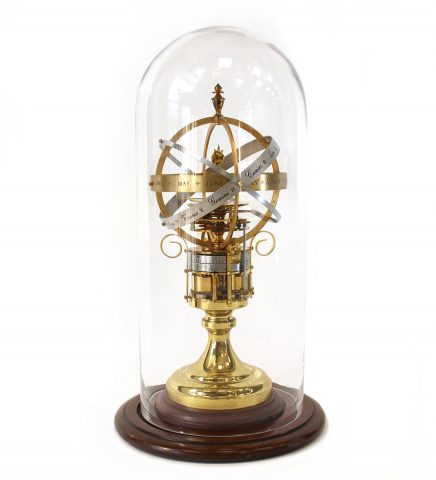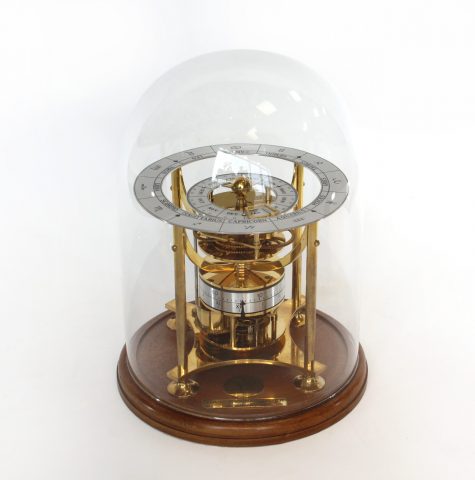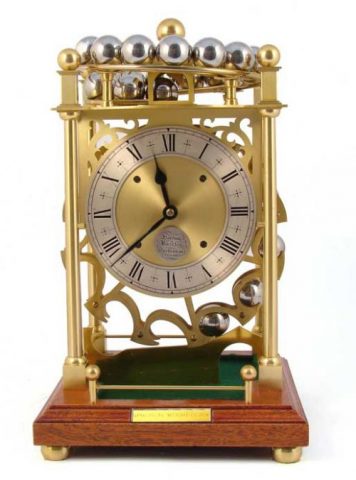This is an exceptional and rare 1980s skeletonised glass bell ships’ bell striking table clock signed by Mappin and Webb, London.
This clock is a faithful copy of the Ship’s Bell Clock made by Charles Frodsham for the Festival of Britain in 1951 [*]. When Devon Instruments acquired Charles Frodsham & Co. Ltd. in 1976, they were already making high quality clocks based on traditional English manufacturers. This model was made using the design blueprint acquired and made as a special edition for Mappin & Webb, the high-class London jewellers.
The beautifully engineered eight-day two train movement has bell-shaped brass plates in excess of 3mm thick, with the platform lever escapement visible from all sides. The platform is regulated by sprung bimetallic balance. This is not a mass-produced movement that has been adapted; it has been purpose-made as a standalone production for this clock.
The twin hammers strike a ‘ship’s bell’ sequence, most unusually sounding directly onto the hand engraved heavy glass bell-shaped domed cover. The strike of leather on glass gives a lovely mellow tone.
The ships bell sequence increases by one strike every half hour, from one til eight strikes, marking the build of a standard four-hour watch. The sequence starts again at 4, 8 and 12 o’clock. The strike snail is a 24-hour count, to include a modification for the Dog watch (in marine or naval terminology, the dog watch is the work shift between 1600 and 2000 (4 p.m. and 8 p.m.). It is split into two, first and last dog watches, each increasing by one strike per half hour, from one to four strikes. Wikipedia has an excellent description.
The backplate is stamped MAPPIN & WEBB LTD, LONDON over Serial No.043.
Silvered Roman numeral chapter ring with Arabic five minutes within the outer track and pierced blue steel trefoil hands.
The clock is mounted on a circular brass ropetwist edged moulded mahogany base, the brass plate inscribed Maritime England, 1982.
- 27cm (11.75ins approx.) high.
The movement is to be overhauled and guaranteed for 3 years.
[*] see plate 55 p 398 of The Frodshams , The Story of a Family of Chronometer Makers 1758-1980, by Vaudrey Mercer.
The book explains that Devon Instruments Ltd. was formed in 1946 to develop a commercial side to the traditional clockmaking and repairing training given to disabled persons at St. Loye’s College, Exeter. By 1980, some 86 people were employed, a high proportion of whom were disabled. The number included many of the original trainees from St. Loye’s College with which strong links were still maintained.
Note that the photographs are stock photos of an identical clock recently sold, whilst number 043 goes through the workshops.
Other interesting skeleton clocks in stock from the same era:
Ref: SA160
Make an enquiry






